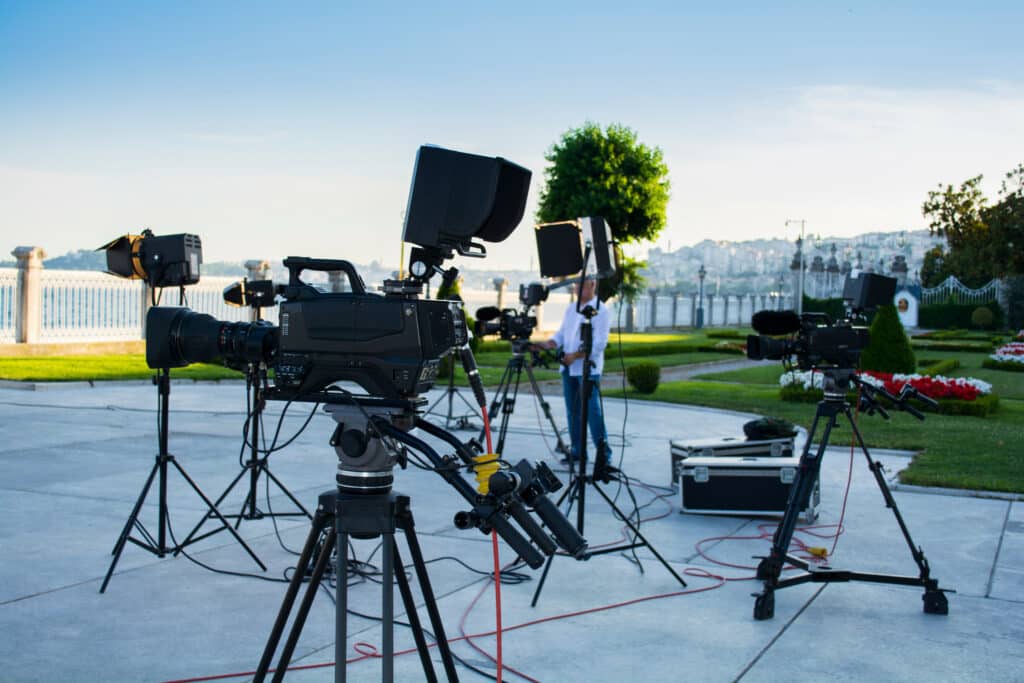The preproduction phase is the foundation of any successful audiovisual project. When it comes to filming in Spain, meticulous planning is even more important due to the diversity of locations, legal particularities, and the management of local talent. This article will guide you through the essential steps for a smooth and efficient preproduction, ensuring that your shoot in this country is a success from day one.
Remote planning from abroad
Distance should not be an obstacle to effective preproduction in Spain. Thanks to technology and the availability of local professionals, you can lay the foundations of your project from anywhere in the world.
Communication tools and local coordinators
For planning a remote film shoot, it is essential to establish clear and efficient communication channels. Video call platforms, project management software, and collaborative tools are your best allies. However, the key piece is having a local coordinator in Spain. This professional acts as your eyes and ears on the ground, managing day-to-day operations, overcoming language and cultural barriers, and ensuring that everything progresses as planned. A good fixer in Spain is invaluable for logistics and connecting with local talent.
Location scouting strategies
Spain offers a wealth of landscapes and architectures that make it an unbeatable natural set. A well-defined location scouting strategy in Spain will allow you to find the perfect setting for your story.
Using Spain’s AI location search
Technology is revolutionizing location scouting. Innovative tools such as the AI-powered location search by Spain Film Commission transform this process. Simply describe what you are looking for in your own words, or explore by visual similarity between images, and the tool will help you find exactly what you need in the fastest and most accessible way. It is an efficient way to narrow down options before the physical visit.
Virtual scouts and tech recce
Before traveling, take advantage of virtual scouting tools. 360° tours, high-resolution photos, and detailed plans will allow you to evaluate potential locations remotely. A “tech recce” or virtual technical scouting with your key team (DOP, director) is crucial to discuss aspects such as lighting, acoustics, and logistical challenges, minimizing surprises when you arrive on site.
In-person scout logistics
Once locations are preselected remotely, in-person scouting is indispensable. Carefully plan logistics: flights, accommodation, local transport, and a detailed itinerary. Having a local coordinator in Spain at this stage is vital to manage appointments, preliminary permits, and any unforeseen events that may arise during visits.
Hiring local professionals
Spain has a mature audiovisual industry and a wide talent pool. Hiring a film crew in Spain with local professionals means efficiency and knowledge of the terrain.
Crew roles and daily rates
The film crew in Spain consists of highly qualified professionals. We have seen in previous articles salary ranges for key roles such as the DOP (between 30,000 and 75,000 euros gross per year), the gaffer (hundreds to several thousand euros/day with equipment), and the sound engineer (25,000 to 50,000 euros gross per year). The camera operator in Spain also ranges between hundreds and several thousand euros per day/week. It is important to know these averages for realistic production budgeting.
Where to find professional crew
To find the best film professionals in Spain, you can turn to international platforms like Mandy.com or ProductionHub, but also to local resources. Regional Film Commissions and specialized directories of professional associations are excellent sources to connect with film technicians and production professionals in Spain. Networking at festivals and industry events is also very valuable.
Contract basics and payroll
When hiring a film crew in Spain, it is essential to understand the differences between hiring direct employees or freelance filmmakers. Contracts with the crew usually include clauses about services, schedule, remuneration, intellectual property, confidentiality, and dispute resolution. Regarding payroll, it is important to know that Social Security in Spain involves contributions both for the employer (approximately between 32% and 38% of the gross salary) and for the employee, covering retirement, unemployment, and other contingencies. A fixer in Spain can guide you through these complexities.
Permits and legal paperwork
Obtaining the necessary permits is one of the most important challenges in preproduction for filming in Spain.
National and regional permit process
The process to obtain permits to shoot in a specific location can vary in Spain. While there are national regulations, most permits for shooting in public spaces are managed by municipal authorities or regional film offices. Each Autonomous Community and town hall has its own regulations, fees, and deadlines. It is crucial to establish contacts beforehand through the film offices of the area where you plan to shoot, as some may offer general permits for small crews, while others will require specific permits with more advance notice for larger projects or those involving road closures.
Insurance and risk assessments
Having insurance is an unavoidable requirement for the film production stage in Spain. You must contract a civil liability policy that covers any possible damage or accident during filming. Additionally, it is essential to carry out a thorough risk assessment for each location and activity, identifying possible hazards and developing contingency plans to mitigate them. Beyond being a legal requirement, it is a fundamental practice for the safety of the crew and the protection of your investment.
Budgeting and tax incentives
The production budget in Spain must take into account the inherent expenses of filming, but also the significant tax advantages offered by the country.
Accessing Spain’s tax rebate
Spain has attractive film tax incentives, which can represent considerable savings for your production. These incentives, regulated by the Corporate Tax Law, allow producers to recover part of their investment through tax deductions. For foreign productions, this translates into an incentive that can reach 30% on the first million euros of deductible base and 25% on the excess, provided that the spending on Spanish territory is at least 1 million euros (or 200,000 euros for animation). These benefits are a decisive factor that positions Spain as a very competitive destination for filming.
Travel, accommodation and logistics
Managing travel and accommodation logistics is a vital component for the efficiency of preproduction and shooting.
Regional cost differences
As mentioned above, the cost of living and, therefore, accommodation and transport costs can vary considerably between regions of Spain. Madrid and Barcelona usually have higher prices than other cities or rural areas. When planning your travel logistics for filming in Spain, consider these differences and look for options that fit your budget without compromising the comfort and accessibility of the crew.
Sustainability considerations
Increasingly, sustainable filming is becoming an ethical and operational imperative. Spain is adopting greener production practices, such as waste reduction and recycling on set, the use of renewable energies, and minimizing the carbon footprint. It is important to integrate sustainability criteria in all phases of your preproduction, choosing environmentally conscious suppliers and promoting the use of electric vehicles or public transport when possible. Some film commissions offer guides for sustainable filming that can be very helpful.
Preproduction checklist and useful contacts
To ensure you don’t miss anything, here is an essential checklist for your preproduction in Spain:
• Define the script and shooting plan: how many days, where, with which crew.
• Create a detailed budget breakdown: including personnel costs, equipment rental, locations, travel, insurance, and unforeseen expenses.
• Research and preselect locations: using AI tools and virtual scouting.
• Contact film offices: for permits and local advice.
• Identify and contact key crew: Director of Photography, Art Director, etc.
• Draft contract templates: for crew and suppliers.
• Obtain production insurance quotes.
• Plan travel and accommodation logistics.
• Establish a sustainability plan for the shoot.
Useful contacts: Contact offices for filming in Spain are your first step to get permits and local resources. Spain Film Commission can also offer you a national overview. And, of course, Spain Film Commission is your strategic ally for any needs that arise.
How Spain Film Commission makes your preproduction easier
Preproduction is a complex process, especially when filming in Spain from abroad. At Spain Film Commission, we specialize in simplifying this critical phase for our international clients. We act as your comprehensive fixer, offering everything from an AI-powered location search engine for finding filming locations in Spain, to expert management of complex permits and hiring a professional local crew.
Our deep knowledge of the Spanish market, labor laws, and tax incentives ensures that your production budget is optimized and that you access the tax rebate for your film work. We handle all the travel logistics for filming in Spain and advise you every step of the way so that your project complies with safety and sustainability standards, even exceeding your expectations. With Spain Film Commission, your preproduction becomes a smooth experience, allowing you to focus on the creative vision of your film.




